|
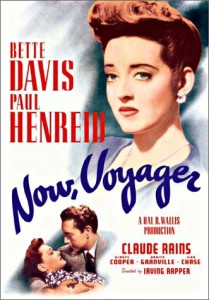
Synopsis:
The dowdy daughter (Bette Davis) of a domineering matriarch (Gladys Cooper) is encouraged by a friendly psychiatrist (Claude Rains) to take a trip abroad, where she transforms into a sleek and elegant young woman, and soon falls in love with a troubled married man (Paul Henreid) whose daughter (Janis Wilson) is just as insecure as Davis herself once was.
|
|
Genres, Themes, Actors, and Directors:
- Bette Davis Films
- Bonita Granville Films
- Character Arc
- Claude Rains Films
- Irving Rapper Films
- Romance
- Spinsters
Response to Peary’s Review:
Peary begins his review of this “shrewdly” scripted adaptation of Olive Higgins Prouty‘s novel by labeling it “a ridiculous soap opera that is great fun”. He refers to it as “both one of cinema’s great romances and one of the most manipulative tearjerkers about female sacrifice”, noting that it’s “full of dramatic love scenes, verbal battles, humor, tears, and, best of all, mature dialogue between Davis and men.” He calls out in particular the film’s infamous “final scene” between Davis and Henreid, featuring “Davis acting both noble and sacrificial; Max Steiner’s swelling music coaxing tears to our eyes; Henreid, for the umpteenth time, lighting two cigarettes simultaneously and handing one to Davis (their inhaling and smoky exhaling is the equivalent of sexual intercourse); and Davis delivering that beautiful last line: ‘Don’t let’s ask for the moon when we have the stars’.”
The storyline for Now, Voyager is contrived beyond belief, but enjoyably so — if you’re willing to go along for the ride. A classic “women’s picture” (DVD Savant refers to it as “the perfect distillation of narrative themes and romantic elements to attract the female audience in 1942”), Now, Voyager chronicles Davis’s magical transformation from a beetle-browed, plump spinster on the verge of a nervous breakdown, to the most popular guest on board a cruise ship — a woman unafraid to finally emerge from under the crippling dominance of her abusive mother and spread her wings, exactly how she chooses. Davis, naturally, is superb in this tricky central role, while Claude Rains is top-notch in a too-small (but critical) role as her kindly psychiatrist (if only we all had such a guardian angel/father-figure waiting for us in the wings!). Henreid, despite Davis’s apparent initial misgivings, is finely cast as her illicit European “lover”, and Gladys Cooper is appropriately hiss-worthy as her villainous mother (as noted by DVD Savant, “Not until Psycho did the movies come up with as potent a horror-mother as old Mrs. Vale”).
Redeeming Qualities and Moments:
- Bette Davis as Charlotte Vale (nominated by Peary as one of the Best Actresses of the Year in his Alternate Oscars)
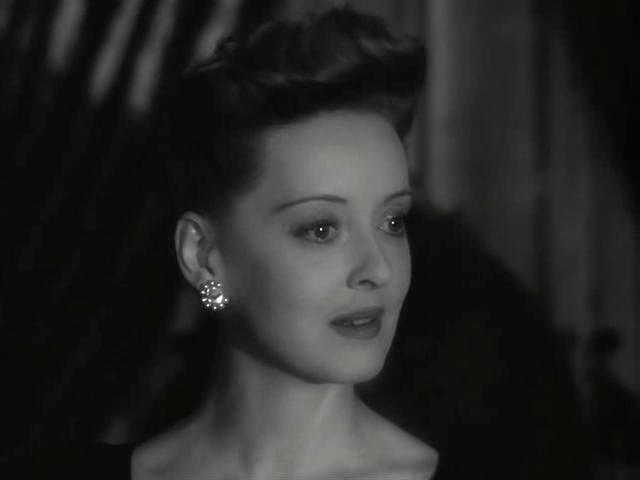
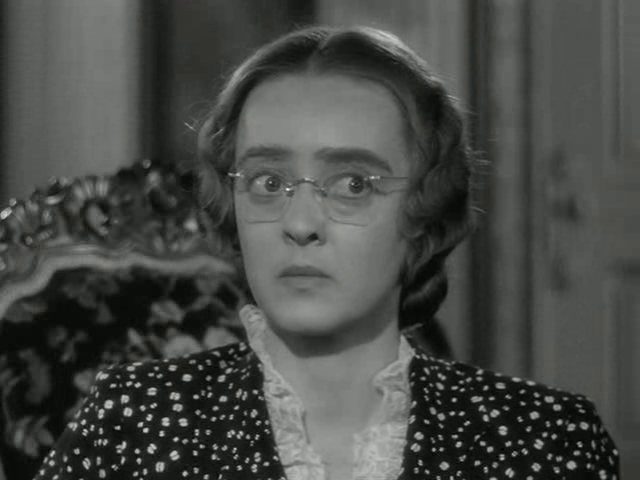
- Paul Henreid as Jerry
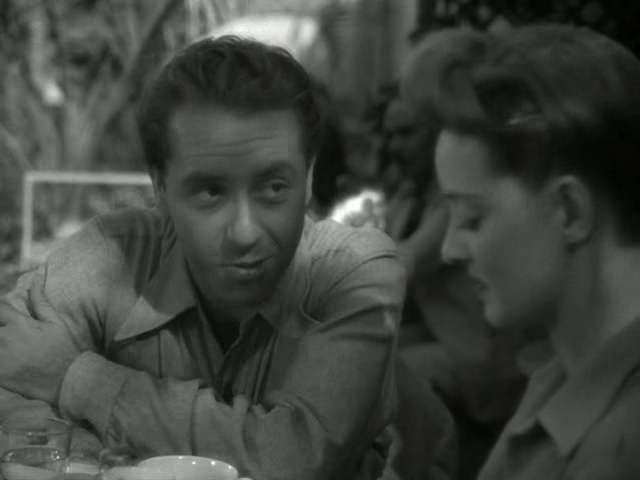
- Claude Rains as Dr. Jaquith
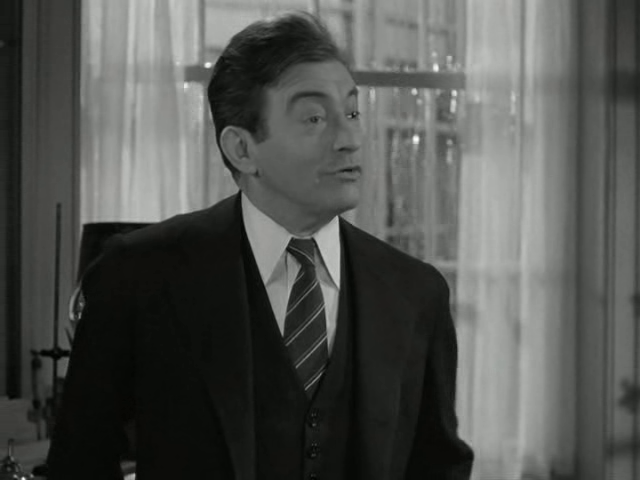
- Gladys Cooper as Mrs. Vale

- Atmospheric cinematography
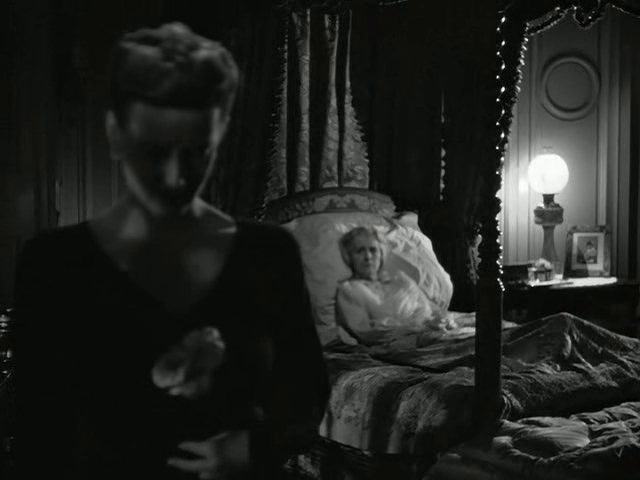
Must See?
Yes, as a classic “women’s picture”.
Categories
(Listed in 1001 Movies You Must See Before You Die)
Links:
|







One thought on “Now, Voyager (1942)”
A no-brainer must, as a solid classic of the ’40s.
Unlike Peary, I don’t think there’s anything “ridiculous” or “manipulative” about ‘Now, Voyager’. Is it contrived? One can argue that just about any movie is contrived; question is, as an audience member, are you buying it as believable? ‘N,V’ goes to some lengths to make sure its audience will buy into it. Yes, it’s soap opera – but, on its own terms, it doesn’t come off as far-fetched.
Although a number of ffs will appreciate it simply as a well-made movie in the old-school Warner Bros. tradition, the film’s biggest fans are likely to be those enchanted by Davis – or those who are gay – or are both. It’s also likely that gay director Irving Rapper knew how this film would read to gay audiences seeing the ‘veil’ in ‘Charlotte Vale’. At least in the ’40s, an old maid aunt and a repressed gay man (or woman) were so often cut of the same cloth. (Apparently Rapper was present during casting as well; making sure not only that Franklin Pangborn got a role, but also the drop-dead-dreamy Charles Drake as a shipboard bf.)
Gays cannot claim most of the ownership on this film, however. ‘N,V’ makes a rather powerful statement for feminists. I imagine, even today, the film can speak lour and clear to women who do not feel particularly empowered.
Regardless of which group embraces the film most, ‘N,V’ has a very strong message regarding the need to defining yourself as the person you want to be. In the story, Davis may be the one having a nervous breakdown, but her character is surrounded by people who could very well discover much less about themselves than Charlotte eventually does.
(As for Cooper…having just rewatched ‘Craig’s Wife’, I found myself comparing Mother Vale to Harriet Craig – and wondered what Harriet would have been like with her own kids. Mother Vale appears to have a contempt for life and the people in it that echoes Harriet.)
Screenwriter Casey Robinson has served up a richly literate script which is a joy to listen to. The script is largely seamless (except for the one odd and long sequence involving a cab driver who doesn’t speak English; I’ve always found that semi-comic scene to be out of a different film) – and the film is refreshingly mature in matters of the heart (i.e., when not to marry; what to endure if you love someone).
Favorite line:
Claude Rains to Gladys Cooper: “‘A mother’s rights’, twaddle!”